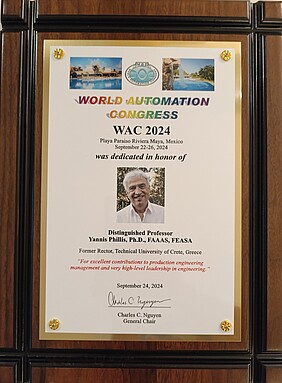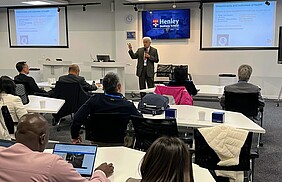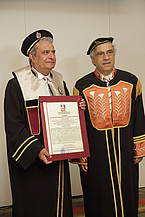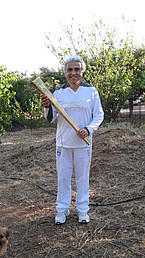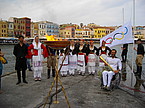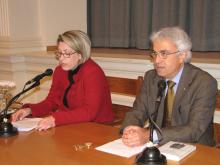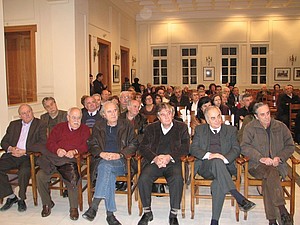News
Medal of Honor at the World Automation Congress (WAC2024)
Medal of Honor for Professor Emeritus and former Rector of the Technical University of Crete, Yannis A. Phillis
10/09/2024 Distinctions Source: Public & International Relations Social Α2
Professor Emeritus and former Rector of the Technical University of Crete, Yannis A. Phillis was recipient of a Medal of Honor at the World Automation Congress (WAC2024) which took place in Cancún, Mexico from 22 to 25 September 2024. Its theme was machine learning and artificial intelligence. The award was bestowed upon the honoree "For excellent contributions to production engineering management and very high-level leadership in engineering." Professor Phillis also gave a keynote talk entitled "On a mathematical theory of sustainability assessment and decision making."
At the award-giving ceremony Professor Phillis addressed the audience as follows:
"Ladies and gentlemen good evening. I would like to thank for their support and kindness Founding Chair, Professor Mo Jamshidi as well as all the members of the Organizing Committee who made this Congress a reality.
The theme of the Congress is machine learning and artificial intelligence, but I also noticed some specific topics such as circular economy, climate change, community safety, smart living.
We've made tremendous progress in science and technology in just a few decades. However, we shouldn't ignore the shortcomings of this progress. I am talking about aspects hinted at in the previous topics. We cannot be proud of the anthropogenic climate crisis, the chaotic economic inequalities among countries and citizens, the irreversible ecological disasters that threaten our very existence, the obscenity of resolving national or international disputes and grudges through war. It occasionally seems that with time we become more and more intelligent and less and less wise.
We cannot provide technical fixes to such problems and then lay back ignoring politics and human nature. Science cannot be apolitical. We have an enormous amount of interdisciplinary work ahead if we want our society to be sustainable.
But I'll go one step further. All these years I have come to the realization that, important as our material world might be, the most permanent things in life do not contain ordinary matter as gadgets and cars and cell phones do; they do not contain molecules and atoms but something that our advanced and, mind you, material brains conceive in a totally different vein. I am speaking of beauty, friendship, camaraderie, love - the deepest essence of humanity.
And this gathering here tonight has it all.
Thank you, indeed!"
The audience gave Professor Phillis an enthusiastic standing ovation.
Keynote Speaker Liss 2024
Professor Emeritus Yannis A. Phillis keynote speaker at LISS2024
07/30/2024 Source: Public & International Relations Social Slider https://www.tuc.gr/en/university/in-the-spotlight/item/professor-emeritus-yannis-a-phillis-keynote-speaker-at-liss2024
Professor Emeritus and former Rector of the Technical University of Crete, Yannis A. Phillis was a keynote speaker at the 14th International Conference on Logistics, Informatics and Service Sciences (LISS2024), which took place at the Henley Business School Africa in Cape Town, 26-29 July, 2024. The title of his talk was "A national healthcare model under climate change", which created a lot of interest and a lively discussion.
The talk was part of a project the speaker completed with Professor Vassilis Kouikoglou. In it quantitative measures are examined regarding new investments in medical personnel and equipment to keep life expectancy at a desired level against disasters and new diseases caused by the climate crisis. Specific actions are designed for 190 countries. As an example, Greece must double its medical budget by 2050, in today's prices, to compensate for life expectancy reductions from climate warming. Poor countries are affected the most since they lack the necessary resources and financial capabilities.
2023 Chania Book Festival Yannis Phillis
Historic Cafes Routes

Prof. Yannis Phillis for the environmental struggle: Time is running out in many areas
Planet Earth
Professor Yannis A. Phillis*, one of the judges of the 7th international poster contest by the Typography Museum, gave a speech regarding the importance of sustainability, but also the dangers that Earth is facing due to human decisions.
Typography Museum, located in BIOPA, Chania, is a member of the Industrial Heritage Route, certified by the Council of Europe.
“It is a privilege for me to be part of the committee of the 7th international poster competition organized by the Museum of Typography of Yannis and Eleni Garedakis. Primarily because of its theme: “Planet Earth at the ecological crossroads.” This theme is dear to me and couldn’t be more timely. Yanni and Eleni, I congratulate you for your choice.
I have been lecturing, writing and doing research on the environment since I was an engineering student. All these years I was always hoping for some progress but reality proved otherwise. Although science is unequivocal, human activities, mostly for the sake of short-lived profits for a few, are destroying our home, often irreversibly. Sustainable growth is a contradiction in terms on a finite planet. Infinity is a mathematical fiction; everything is finite including how much growth Earth can tolerate. The motto of the fossil fuel industry “drill baby, drill” is plain idiotic nowadays.
Think of lost species, climate warming, forever chemicals, plastics, droughts, natural (actually unnatural) disasters, ice melting, forest losses, air pollution. And all those coupled with obscene inequalities and poverty give you a glimpse of the present state of our society and what the future has in store for us and all the living creatures on our tiny speck in the universe. It is high time that we took action if we want to bequeath a livable planet to our children. We can no longer tolerate ignorant or indifferent leaders who care only about their reelection and glory. We can no longer accept an economy that cashes in the environment so that a group of billionaires may see their names in the pages of Forbes. None of this is sustainable.
A few specific examples suffice to show that something is seriously wrong with our economic activities. In 2021 temperatures in Greece reached 46οC. Many of the country’s forests were ravaged by mega fires with enormous ecological and social consequences.
In Italy temperatures reached the unprecedented level of 48.8οC. At the same time in Germany and Belgium enormous floods destroyed property and killed people. A year later back in Greece, until July 55,000 thousand acres of mature forest were incinerated and part of the unique protected forest of Dadia in Thrace was burned down―a 50% rise relative to the average between 2006-2021, according to EFSIS (European Forest Fire Information System).
In the summer of 2022 the lovely Portuguese town of Pinhão experienced 47οC. Only in that summer heatwaves in Western Europe caused 20,000 deaths. To continue the story, in April 2023 temperatures in the Tai province of Tak registered 45.4οC and in Luang Prabang, Laos 42.7οC.
Recent research showed that, among 19,000 young Australians of ages 15-19, 26% were “fairly or very worried” about climate change in Australia. A sizable 38% experience stress or feel desperate. They feel that the world won’t be livable and they didn’t want to have children.
The Lancet report of October 2022 noted:
-
Deaths of infants below one year and elderly above 65 attributed to extreme temperatures rose by 68% in 2017-2021 compared to 2000 – 2004.
-
In 2021 470 billion man hours were lost at a cost of $700 billion due the extreme weather, a 40% rise compared to 1990.
-
Malaria seasons rose by 32% in the Americas and 15% in Africa relative to 1950 and dengue fever rose by 12% in the same period.
-
Red meat and milk contribute 55% of agricultural greenhouse gases emissions. A drastic reduction of red meat eating would help climate and prevent 11.5 million diet related deaths.
Several solutions have been proposed to the climate problem, among them production of hydrogen as the fuel of the future. This is mostly plain greenwashing. So called blue hydrogen is produced from natural gas generating in the process climate destroying gases. In some sense it is the Trojan horse of more fossil fuels. Green hydrogen may produced on a small scale but this is another story.
My involvement in the selection of the best posters was quite challenging but also enjoyable. “Best” for me meant a strong and direct message of environmental urgency in conjunction with artistic value. It had to do with a global outlook of the planet. After all the theme of the competition demanded that. As well as its direct and urgent ecological message, a poster had to have artistic appeal and proper grammar. Of course, there is a lot of subjectivity in such a process and that is the reason why three members voted for their preferences instead of one to diffuse subjectivity to some extent.
A paper accepted for publication in the Harvard Environmental Law Review, suggests to sue oil companies. Using legal arguments it claims that it is possible to prosecute those corporations on grounds of murder. Given that oil corporations knew very well that their products warm the climate causing extreme weather and the appearance of new diseases, thus killing people, and they tried hard to obfuscate the truth, they could be brought before justice for murder.
BP had been sued in the past after the Gulf of Mexico disaster that killed several people and created an ecological disaster. The company pleaded guilty in court for manslaughter and paid in all $65 billion. However, even if oil companies pay fines, it is more profitable for them to continue drilling because their profits are way higher than the cost. And all this with the blessings of most governments, which sometimes are literally bought by oil, destroying climate and our children’s future.
But let’s go back to the competition. I went through more than one thousand posters and often felt sorry having to reject some interesting ones but this is life in a selection process. Regardless of outcome, I saw passion and quality in many submissions. People understand and worry. At the same time I noticed that some submissions had been gulled by the fossil fuel industry. I saw posters with pictures of hydrogen or cows feeding in idyllic fields. What I was looking for was simplicity, directness of the message, a global ecological perspective and esthetic sensitivity.
The choices the committee made satisfy all those. People realize immediately that something is gravely rotten on Planet Earth. The big question is what to do. The first step is to educate ourselves. The second is to act by voting for those politicians who understand the ecological crossroads – most don’t -, by changing lifestyles, consuming less, avoiding plastics, eating less meat, using public transportation, becoming activists. Take to the streets demanding change. Most politicians and corporate CEOs would be scared of massive peaceful protests and most of them would do nothing in the absence of massive protests. Their priorities are money, power, glory. The rest is for us.
The ten-thousand-year-old experiment of our civilization is threatened by a premature end the same way the life of an obese person could prematurely end if he continues eating excessively.
The final word of the environmental struggle has not been written. But time is running out in many areas. Let’s carry on the struggle with greater passion and conviction. This competition is a small step towards this goal. We must continue. Thank you.
Yannis A. Phillis”
*Professor Emeritus
Technical University of Crete
School of Production Engineering and Management
Appeal to language _ a review
Appeal to Language Poems by Yannis Phillis
Hearty congratulations, Yannis, for the reason that your poems of this collection have appeared in Poetry Salzburg Review & Contemporary Poetry Volume 3. We very much wish that you come up with many more stories to narrate. Reading your book on poems was actually like reading stories. I found your writing very unique because of this.
Your love for rain is evident as I read and loved your lines “Where are the rainy nights that cleanse the face and return it to you in the morning eager by a new adjective to be graced” and your description on that night so vivid that the entire scene was before my eyes as in Rain in Athens. In Communication, “The rain is transforming the city into a metaphor as the drops tap out on the polished streets their own code, one which no one will get but the rain persists for the sake of one lonely bitter orange tree on the sidewalk which will shamelessly represent the world the moment everyone has fled”. This is something awesome I felt. Left me dumbstruck with your unique idea of rain communicating with Athens!!!
“How many voices, how much laughter, how many rituals does it take to nullify this void, how many trials and errors were required to settle me here on this speck of dust in one of billions of galaxies”. These lines seem straight from your heart as you reminisce your time with your family and that you are all alone in that same old place cutting bread, as in Time.
As your travels from Corinth to Athens, you seem to speak to yourself in lines, “I am gazing at cypress trees through the window as they hasten past like a film out of sync bending to wind’s whim. For a moment, I feel they are bowing to us as we pass but know as well we are but a fleeting details in a landscape that converses solely with wind and rain”.
Memory of Things, “I have no idea what I was looking for that afternoon, My old friend for years unable to communicate, victim of a degenerative brain disease. He looked at me for a fleeting moment and then his gaze returned to his blank void. His memory free to travel in space. I caught a glimpse of the galaxies it was crossing the lack of anything written between”. I can relate with your emotions for your need and eagerness to communicate with your friend but you couldn’t. “Not even she ever learned how Antonis from Thessalonika struggling to return to his childhood one morning made his escape from human memory on a scheduled flight gone missing for thirty five years now” in Escape; these two poems were really very touching.
How you were in Tibet, the country of nameless ghosts, “Mountain peak and above it vultures drawing circules before settling onto the naked dead bodies the poor villagers had laid there for a sky burial…At passport control arrival without departure is not allowed”.
Yannis, you seem to be a nature lover which is clear from your creations as in Easter Island, Santiago, Chile, San Juan – Puerto Rico, August, Midday because you have been able to capture all the aspects of nature along with movements of people. Reading them was like treat to my eyes and it was something like watching a movie.
How staring at the small ink bottles and the pages left unwritten, and penning song lyrics, mathematical symbols, food recipes, directions of a young woman’s home, leaving the ink for your descendants because they are of no use to you is something very differently penned by you, which I liked.
“There were many walls those people pray before and those that divide people into races, walls we call home. There were also those with works of art, walls colored, white, empty, walls of camps or of prison, walls of educational institutions”. This was philosophical but so true. Don’t we live amidst the walls? Answer is yes; many walls like walls of Ego, walls of hatred, walls of pride, etc.
Appeal to Language, your curiosity to learn about words with no antonym, two things unequivocally, one or two things from their opposites, as you sum up your poem, “I want to say that the wrong language is the lack of language. I want to say that language is not a euphemism”.
In Prologue, I agree to your words, “And things are better understood if left unsaid, and poetry is the art of leaving things ineffable”, and in Stories of Greece,“The investigation of names is the beginning of education, Antisthenes, The first duty of the true leader is the restoration of names Confucius”.
Readers, I am sure will love to read your poems penned in Civil War I and II.
By then I learned that only through silence are the hardest stories told” as in Silence, and “Science tells us one day everything will end” are the best catch lines ever. So philosophical and yet so true!!!
This book are more like his memoirs he experienced through his life which include more of nature, philosophy and war. Different topics and different stories to narrate!!! Readers, you will love all of them.
Yannis, we wish that your book inspires many more Writers like me to write differently and travels far and wide and garners all the recognition and fame. We look forward to your next book, as well. I will be happy to write a review for that one too!
All the best.
Shubhaangi Kundalkar
Author – Justaju-In Search of Life
A meeting with a friend ...
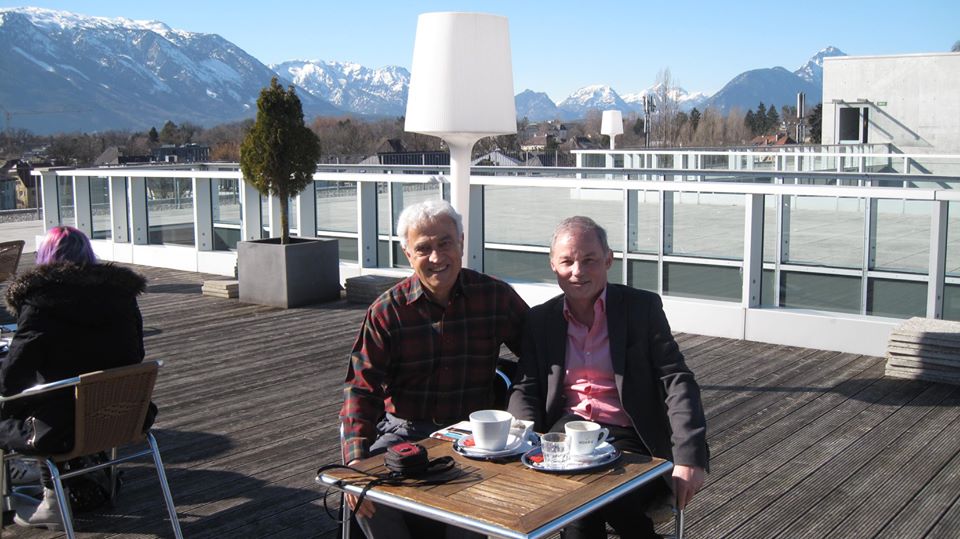
On 28 February 2019, Yannis A. Phillis, long-time contributor and subscriber to Poetry Salzburg Review, Engineering Professor Emeritus at the the Technical University of Crete in Chania where he was Rector for more than 12 years, visited editor Wolfgang Görtschacher on the occasion of Yannis's introduction to the European Academy of Sciences and Arts, which took place at the University of Salzburg. A most memorable meeting at the University's rooftop café.
A Mathematical Model of National Sustainability: Where the World is Heading
Distinguished lecture at the Institute for Advanced Study of City University of Hong Kong,
Yannis A. Phillis, Professor Emeritus and former Rector of the Technical University of Crete, was invited at the Institute for Advanced Study of City University of Hong Kong, to present a distinguished lecture titled “A Mathematical Model of National Sustainability: Where the World is Heading”, on March 29, 2019. At the lecture, Professor Yannis A. Phillis, a Fellow of American Association for the Advancement of Science, discussed a mathematical model that defines and measures national sustainability, called SAFE: Sustainability Assessment by Fuzzy Evaluation.
Abstract of the lecture:
Large scale global problems threaten the welfare of modern societies: species extinction, climate change, poverty, refugee crisis, to name but a few. Future projections of these problems are not optimistic raising the question of sustainability worldwide. To answer this question a definition of sustainability has to be given.
In this talk, a mathematical model will be described that defines and measures sustainability, called SAFE: Sustainability Assessment by Fuzzy Evaluation. SAFE uses data spanning the period 1995 – 2016. In all, 71 time series of basic indicators are used to generate various intermediate sustainability indices and finally an overall index for 161 countries which are ranked accordingly. Data are manipulated statistically to introduce memory, then normalized in [0, 1] and finally passed through a sequential fuzzy reasoning system to obtain the SAFE sustainability index. Missing data are generated through an imputation algorithm. The model includes modules that expose various dynamic features of sustainability worldwide.
A sensitivity analysis reveals those indicators with the highest potential of improving sustainability. Worldwide, renewable energy generation, corruption, forest change, Gross National Income, and Red List Index for species are the most prominent indicators, while in developed countries CO2 emissions appear first. Indeed, it is well established that climate change, poverty, and species extinction are at the forefront of global problems threatening the global wellbeing. Most countries have made modest progress towards sustainability over 1995-2016. Interestingly, North America shows a small decline. Another counterintuitive result is the relatively low ranking of advanced countries such as South Korea, a fact explained satisfactorily by the model.
“How to define and evaluate national security in an era of climate change”
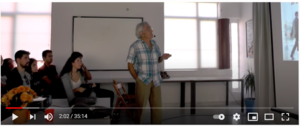
Urban Sustainability Talk by Yannis Phillis at TUC KEGEP
On Wednesday, October 18th, 2017 the Language Centre was pleased to have our first guest speaker for this year’s English Talks Series, Professor Yannis Phillis. He spoke on the issue of “Urban Sustainability” demonstrating the need for a global shift in the approach to urban development. Factors impacting urban sprawl within a potentially catastrophic scenario for the future included deforestation, population growth, over-consumption and the burning of fossil fuels.
Printing Museums - Records of civilization
Talk given at the 2017 Conference of the Association of European Museums, Chania, Greece.
Introduction
According to Merriam-Webster dictionary museum is a place for the Muses, in Greek Μουσεĩον. A museum “is an institution that cares for (conserves) a collection of artifacts and other objects of artistic, cultural, historical, or scientific importance1.” Most museums make these items available for public viewing. Worldwide there are about 55,000 museums. We have numerous types of museums such as the Acropolis Museum, the American Museum of Natural History, the British Museum, the Louvre, the Fortress Museum of Salzburg where weapons, armor, and instruments of torture are exhibited, the Museum of Typography in Chania and so on.
Why do we need museums? First and foremost, to keep stories and memories of our civilization alive.
Second, to feel the continuity of time. Where we come from and where we are heading. Most of us need to belong somewhere: a nation, a religious group, a political party, a soccer club. This need goes back to our evolutionary adaptation to belong to a group for simple reasons of survival. At the same time we need a story or myth of this “somewhere”. Museums preserve such stories and myths.
Third, there is always an element of nostalgia of the heroic “good old days” in museum collections, despite the fact that no one can or wishes to return to those days.
Fourth we use museums for research.
Printing
The movable type of printing appeared around 1439 thanks to Gutenberg and the dissemination of knowledge began changing rapidly. The famous Gutenberg Bible came out in 1455. Thereafter printing spread like a wildfire. The number of European printed books from about just a few before Gutenberg jumped to 1 billion in the 18th century. UNESCO has estimated the number of new book titles per year at 2,200,0002.
The wider public had access to any kind of knowledge and the religious and political establishments saw that as a threat to their interests. In the 16th century Ottoman Empire it became a sin to print religious material. Jews were banned from German printing guilds. The Roman Catholic martyr William Carter printed a religious book of Dr. Gregory Martin in 1580 in Protestant England. In this book there was a sentence that was erroneously construed as incitement to kill the queen of England. He was imprisoned, tortured and executed in 1584.
The Nazis burned “degenerate works” by Jewish authors such as Mann, Proust, and Marx. The US government burned in the 1950s six tons of Wilhelm Reich’s books. In 1955 the authorities burned large numbers of a comic book in Denmark. In 1967 the Junta of Greece banned the music of Theodorakis as well as many “communist” books. In 1973 in Chile Pinochet ordered the burning of hundreds of books. In 1992 the Bosnian National Library was burned down by soldiers of the Serbian general Ratko Mladic.
However, the tradition of fearing and banning the written word is quite old. The Chinese emperor Qin Shin Huang of the Qin Dynasty in 210 BCE, ordered the burning of the books of Confucius and burial alive of Confucian scholars. Byzantine emperor Constantine the Great in 325 CE, ordered the burning of books by Arius. Anyone who held any of his works would be executed.
The most ignominious act aimed at destroying enlightenment was the burning of the Library of Alexandria in several stages, first when Julius Caesar set his fleet on fire which spread to the Library and then by Aurelian who destroyed part of it when he took Alexandria. Accounts exist about the final destruction of the Library by Emperor Theodosius, the Coptic Pope Theophilus, and the Muslims but these accounts have been contested.
Printing – Civilization
Printing is information and information is the most fundamental necessary condition of civilization. Information can be transmitted and received via sequences or strings, as we say, of binary digits 0s and 1s or bits. Actually, everything, including human beings, in principle at least, can be expressed as strings of bits. We all the time send and receive texts, pictures, numbers, voice, music, control signals, Internet signals, and so on in the form of bits. Our civilization is based on the exchange of information in the form of binary digits.
In order to quantify information in an objective way one has to strip it of its subjective nature and focus on its carriers, the bits. This is done when information is reduced to the probability of occurrence of those carriers regardless of meaning to people. One can then proceed with the analysis and design of information channels and their limits or capacity. Limits on information generation and capacity are in some sense also limits to civilization.
In terms of geological time the appearance of civilization is a very recent event. The human brain created civilization thanks primarily to the evolutionary development of language which seems to have appeared 70,000 to 100,000 years ago3 and writing which appeared at about 3500 to 3000 BCE in Mesopotamia and at 500 BCE in Mesoamerica4.
The invention of printing in the 1450s CE gave civilization a tremendous leap. Then in the 20th century information technologies set the stage for another great leap thanks to the vacuum tube, the transistor, the integrated circuits, the microprocessors, and the computers together with related advances in mathematics and physics.
In the past the written or printed word changed the world sometimes with the help of armies of such great nations as Persia, Greece, Rome, etc. After the invention of printing large numbers of people had suddenly access to information that previously was intended for the privileged. This change was not without turbulence.
In the 19th century industrialists facing urban riots in Europe became advocates of the education of the working classes so that they “govern and repress their passions.” At the same time in Europe a high tax was imposed on printed newspaper pages so that the poor wouldn’t have access to them. In the 18th century it was a crime to teach blacks to read in Southern US States. It seems that people couldn’t agree how to handle information.
Some basic elements of information theory
Information creates civilization. But what is information? In what follows some rudiments of information theory will be briefly given.
Consider a random experiment with n outcomes e1, e2,…, en with corresponding probabilities of occurrence p1, p2,…, pn. The information Ii of event ei is defined as Ii = -logpi. Information is concerned with its carriers which are letters of an alphabet or binary digits in a digital system such as a computer, a TV set, or a cellular phone. Information is not concerned with the meaning of a message, its semantics or pragmatics. The latter are quite subjective and thus, not amenable to a rigorous analysis. The expected or mean information is called entropy H = -p1logp1-p2logp2-…-pnlogpn.
It can be demonstrated that entropy or mean information is a measure of disorder in a random situation. If the base of the logarithm is chosen to be 2, entropy equals the average number of Yes-No or binary questions one asks to find which event occurred. For example, if one of two equiprobable events e1, e2 occurred, one asks only one question: “Is it e1?”. Indeed, the number of binary questions = 1 = -1/2log2 ½-1/2log1/2 = log22 = 2 bits of information as we say.
Similarly, if we have 4 equiprobable events we group them into two groups: e1 and e2 into group A and e3 and e4 into group B. Here we ask 2 questions: “Is it group A?” and if it’s A we ask “Is it e1?”. Once more log24 = 2 bits. In general for n equiprobable events we ask on average log2n binary questions.
One of the fundamental results of information theory states that if a letter of, say, the English alphabet with probability of occurrence pi is to be encoded in a sequence of 0s and 1s, the minimal length of each codeword is equal to the information of this letter, log2pi. If the 26 letters of the English alphabet were equiprobable they would contain log2 26 bits of information = 4.7bits. But the letters are not equiprobable. So, the actual information of the English alphabet is about5 H = 3.32 bits/symbol. This means that one could devise a code such as the Morse code for the English alphabet with average code length of 3.32 bits.
With this in mind, Douglas Robertson6 has derived a rough estimate of the information content of each civilization using a generous H=5 bits/symbol, that is 5 encoded digits per letter of an ordinary alphabet. This estimate does not assess the quality but the size of the information contained in each civilized age.
1. Pre-Language
Whatever each person had in his/her mind ≈ About 2 Iliads ≈ 2 (5 million bits) = 107 bits
2. Language
Knowledge of each person + knowledge of others in the tribe ≈ 100 x 107 = 109 bits
3. Writing
Information content ≈ Content of the library of Alexandria ≈ 1011 bits
4. Printing
Next enormous leap: information ≈ content of books + journals + newspapers + … (assuming a certain shelf life for each) ≈ 1017 bits
5. Computers7
2007 world capacity to store information ≈ 1022 bits
Writing was a great advance that enabled an information leap 100 times greater than its predecessor, language. But the greatest leap was achieved thanks to printing that gave us an information leap one million times greater than its predecessor, writing! Our age is marked by information technology that gave us the ability of transmitting almost any kind of information at the speed of light. This speed is taken for granted today but if one goes back to the 19th century this speed was the speed of man, horse, sailboat, pigeon, or railroad.
Looking at the simple analysis above one sees that the greatest leap so far was that of printing.
Printing Museums
So why do we need printing museums? We need them because they preserve the memory of one of the grandest achievements of humanity that tremendously advanced science, technology, education for all, the arts, religion, and independent thinking, in one word civilization.
To be sure we don’t live in an ideal world happily ever after. We face social problems such as poverty, large income distribution inequalities, violence, famine, intolerance, lack of privacy, and disease. Equally important are the environmental problems such as climate change, species extinction, air pollution, overpopulation, and toxic pollution. However, we cannot give up. We’ll continue the struggle. We need more information to resolve these questions. We have the means: science, technology, arts, printing, schools.
Here in Chania we are very fortunate. We have the only printing museum of Greece, the Museum of Typography founded and directed by Yannis and Eleni Garedakis. The Museum offers a compelling narrative of printing, a technology that changed the world. Its founders must be proud. They gave us a narrative of the human struggle for information, the pride of a job well done, the human struggle for communication. It is a museum and as such it rediscovers the past and it recreates stories of men. Stories without which we wouldn’t be what we are.
I, as a scientist and writer, feel thankful for printing, a simple invention that seems to be trivial and is taken for granted like water or air. I feel thankful because it enabled me to move from my limited world in a village of the Peloponnese to the cosmos ̶ grandiose and sentimental as this may sound. It taught me a few things, verifiable by straightforward observation:
That humanity is a mixture of light and darkness: self interest and altruism, malevolent lies and simple truths, sacrifice and mass murder, love and cruelty, modesty and arrogance, enlightenment and bigotry.
That the absence of civility from politics is the rule rather than the exception. One can abundantly observe this by merely following the debates in the Greek Parliament, the US election campaigns, the Euroworking Group meetings and so on.
That progress is made in small steps despite all the bad things. Yet, progress cannot be taken for granted; we should always guard it against the forces of darkness.
That absolute ideologies and dogmas are catastrophic, because anything absolute goes against nature and life. Absolute freedom destroys the freedom of others, absolute equality is a contradiction in terms and absolute justice is self-effacing.
That enlightenment is mainly achieved through science and greatly enriched through art.
That the song of life is a song worth singing.
References
1. https://en.wikipedia.org/wiki/Museum
2. https://en.wikipedia.org/wiki/Books_published_per_country_per_year
3. J. J. Bolhuis, I. Tattersall, N. Chomsky, and Robert C. Berwick, “How could language have evolved?” PLoS Biol Vol. 12, No. 8: e1001934. doi:10.1371/journal.pbio.1001934.
4. J. J. Mark, "Writing" Ancient History Encyclopedia. Last modified April 28, 2011. http://www.ancient.eu/writing/.
5. F. Pratt, “Secret and Urgent,” Doubleday, Garden City, NY, 1942.
6. D. S. Robertson, “The New Renaissance: Computers and the Next Level of Civilization, Oxford, Oxford, 1998.
7. M. Hilbert and P. López, “The world’s technological capacity to store, communicate, and compute information,” Science, Vol. 332, issue 6025, pp. 60-65, Apr. 2011.
How we can Halt a Runaway Climate
MED'16: The 24th Mediterranean Conference on Control and Automation // Athens, Greece // June 21-24, 2016
Climate change is one of the most urgent problems facing the Earth. Its facets are multiple: environmental, economic, and social, and its consequences could become dire if drastic and concerted action is not taken immediately. Climate change is already exerting a host of stresses on the environment and the society that will intensify with time. In the face of this reality, humanity has done little to avert possible catastrophes. Puzzling as this behavior might appear at first, it can be partially explained by behavioral economics and psychology. The goal of this talk is twofold. First, it investigates the question of whether the UN goal of 2°C temperature rise above preindustrial level is still attainable in an optimal sense and what reductions are needed to achieve it. Second, the paper makes a connection between such reductions and certain behavioral aspects that could make the reductions a reality. These two goals might appear technically distinct – and to some extent, they are. However, there exists a strong cause-and-effect connection between the two since sharp emissions reductions require strong political consensus on the part of politicians, decision makers, and citizens that hinge upon human behavior.
A climate model is used in conjunction with an economic model to examine emissions and temperature dynamics under certain economic growth scenarios. Consumption, carbon emissions, and resulting temperature trajectories are then optimized so that a utility function is maximized with the goal of keeping temperature rise within 2°C above preindustrial levels. Two measures of satisfaction from consumption are considered: a logarithmic utility and a novel, hump-shaped function. The latter is consistent with recent findings about the relation between life satisfaction and income. A meta-analysis follows that links the optimal emissions trajectories with corresponding behavioral requirements. Thus, climate action is presented in a more integral way whereby technical and behavioral attributes are systematically connected. It is demonstrated that:
- the 2°C target is theoretically still achievable, but it hinges upon very drastic measures to be taken almost immediately;
- in a few years we shall exit the 2-degree controllability region and higher temperatures should be expected;
- public cognition of and attitude towards climate change should change in a quantifiable sense;
- this is one of those interdisciplinary problems that need not only hard science and technology to be resolved but also psychology, the humanities and just plain citizens’ action.
Yannis A. Phillis received his diploma in electrical and mechanical engineering from the National Technical University of Athens, Greece, in 1973 and the MSc, Engineer Degree, and PhD degrees in control systems from the University of California at Los Angeles (UCLA) in 1978, 1979, and 1980 respectively. From 1980 to 1986, he was with Boston University, Boston, MA. Since 1986, he has been with the Department of Production Engineering and Management, Technical University of Crete, Chania, Greece, where he is professor and director of the CAM Laboratory. In 1992 and between 2005 and 2007 he was visiting professor at UCLA’s Chemical Engineering Department. In 2008 he was Onassis Foundation Senior Visiting Fellow in the US. His research interests are in stochastic control, discrete-event systems, and applications in manufacturing networks and environmental systems.
Dr. Phillis is a member of the Executive Board of the Journal of Intelligent and Robotic Systems, Advisory Board Member for the IEEE Systems Journal, Associate Editor for the International Journal of Engineering Management, Member of the Editorial Advisory Board for the Environmental Engineering and Management Journal, and was on the Editorial Board of the Encyclopedia of Life Support Systems, and past Editor of the IEEE Robotics and Automation Magazine.
He is the recipient of numerous honors among which Professor of the Year Award at Boston University, 1986; Award by the Academy of Athens for his environmental activities, 2007; Fellow of the Venizelos Research Institute in Greece, 2006; Awards by the Municipalities of Chania and Assini, Greece in 2005 and 2008, respectively for his service to society, science, and letters; Lifetime Achievement Award at the World Automation Conference 2010, Kobe, Japan; and Academic Alumni Professional Achievement Award, UCLA, 2013.
Dr. Phillis was Rector of the Technical University of Crete for 12 years. He has published over 120 scientific papers and four technical books. He is an award winning writer in Greece and the US. He is a Fellow of AAAS; a Senior Member of IEEE; and Member of Sigma Xi; Poets and Writers, USA; P.E.N. Club; and the European Art Center, Athens.
TUC Professor Yannis Phillis selected for the 2013 UCLA Engineering Alumnus Achievement in Academia Award
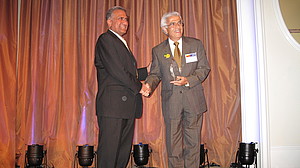
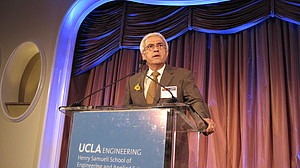
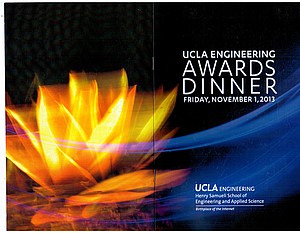
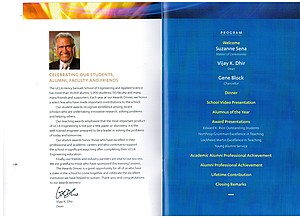
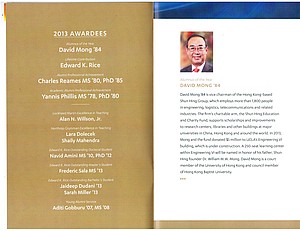
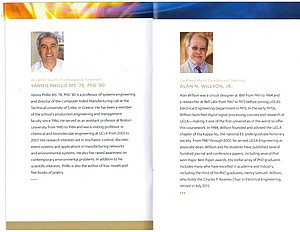
NEW!
Professor Yannis Phillis, former rector of the Technical University of Crete, was selected for the 2013 UCLA Engineering Alumnus Achievement in Academia Award of the UCLA Henry Samueli School of Engineering and Applied Science.
The award that was established in 1965, honors the superior achievements of UCLA engineering alumni who have brought honor and distinction to the School. The hallmark of each recipient is a sterling record of distinguished career accomplishments, complemented by a history of outstanding contributions to the engineering profession. The committee shall be alert to qualified men or women who serve as role models to newcomers to the profession, who contribute to the profession through its organizational activities, or who have provided notable service to the community, and preferably, those who have made contributions to enhance the School. Without exception, awardees have established new standards of excellence to which others in their fields may aspire.
The award was presented to Professor Y. Phillis during an official ceremony on Nov. 1st 2013 in Los Angeles at the Beverly Hills Hotel.
Yannis Phillis gave a short thank you speech:
"I would like to thank professors Asad Madni, Vasilios Manousiouthakis and Hal Monbouquette and Dean Vijay Dhir for their support and kindness. I am thankful for the tools UCLA gave me, with which I learned to appreciate the beauty of science and the cosmos.
Thanks to these tools I also learned to appreciate the shortcomings of our civilization. I know that one of the gravest dangers we are facing nowadays is manmade climate change and if we don’t act drastically within a few years, humanity will face unprecedented hardship.
Above all, I learned that the most permanent things in life do not contain ordinary matter such as cars, TV sets and gadgets, but something totally different. I am speaking of beauty, friendship and love.
And this event tonight contains all. Thank you indeed"
12.09.2012
Award of Doctorate Honoris Causa to Dr. Asad MADNI (USA)
On Wednesday, September 12th 2012, the Technical University of Crete - Department of Production Engineering & Management conferred the title of Doctor Honoris Causa to Dr. Asad Madni in recognition of his outstanding achievements in the area of systems design and signal processing during an official ceremony that took place at the Minoa Palace Resort & Spa Hotel, in Platanias, Chania, Crete (Hall – Imperial I).
Read the opening address of Yannis Phillis, Rector of the Technical University of Crete here.
Programme:
Beginning of ceremony - entrance of the Rector, Vice-Rectors and Heads of Departments of the Technical University of Crete.
Opening address, Yannis Phillis, Rector.
Reading of the
1. Resolution of the Department of Production Engineering and Management by George Stavroulakis, Head of the Department
2. Resolution of the University Senate by Yannis Phillis, Rector
3. Honorary Doctorate Degree by Yannis Phillis, Rector.
Conferment of the doctor honoris causa diploma.
Investiture of doctoral gown, hood and cap.
Lecture by Asad Madni, TUC Doctor Honoris Causa.
End of ceremony.
Watch the video of the interview of Dr. Madni and Yannis Phillis to a local media channel below.
Award of Doctorate Honoris Causa to His All Holiness the Ecumenical Patriarch Bartholomew 4.9.2012
04.09.2012
Award of Doctorate Honoris Causa to His All Holiness the Ecumenical Patriarch Bartholomew
The Technical University of Crete had the honour to confer a Doctorate Honoris Causa to His All Holiness the Ecumenical Patriarch Bartholomew, in recognition of his diverse social, humanitarian, environmental and spiritual work.
The ceremony took place on Tuesday September 4, 2012 at noon at the Park for the Preservation of Flora & Fauna of the Technical University of Crete.
In his laudatory address, TUC Rector Yannis Phillis mentioned, among other things, that:
"We need a change in course, by turning back to elementary but fundamental values, by respecting our fellow man and human diversity and by signing peace with the environment -human, natural and biological. These are the principles by which His All Holiness abides and for which he works."
"When these words are forgotten, when this ceremony is forgotten, one thing shall remain unchanged, sheding a light on us: the work of a man devoted to man; it is this work that we honour today by conferring the title of Doctor Honoris Causa to His All Holiness. How we live our lives is, to a large extent, our own choice. His All Holiness has made his own choices, and we know that these choices have often been hard, very hard indeed. This is the fate of men who help sustain hope in society and show the path to those who are willing to follow."
During his acceptance speech, His All Holiness the Ecumenical Patriarch praised the work carried out by the Technical University of Crete, and at the same time underlined the importance of the protection of the environment.
More specifically, His All Holiness the Primate of the Orthodox Church referred to the efforts made by the Ecumenical Patriarchate for the protection of the environment and underlined the need for the protection of the environment through the use of new technologies and science, without breaking the laws of God or nature. «The law of God is not opposed to technological knowledge and development but to their unethical use” he said. He also emphasized the need to make universal efforts for a better environment. “We hope that the desire for a better environment will become more universal and will result in a scientific proposal and a legislative mandate. Naturally, these efforts will reduce certain exaggerations of deep ecology so that the demand for the protection of the environment will have reasonable and practically applicable limits, and the intervention to the natural environment does not become an obstacle in man’s life on earth”.
Video
5-10.06.2012 Environmental Days
Park for the Preservation of Flora and Fauna
This year, the Park for the Preservation of Flora and Fauna of the Technical University of Crete decided to celebrate the World Environment Day organizing a week of events in an effort to inspire environmental learning, to raise environmental awareness among local people and to promote children's understanding of the environment.
Yannis Phillis opened the "2012 Environmental Days" on June 5th at the Museum of the Park, welcoming the guests, who enjoyed a lovely classic guitar concert and an art exhibition of painting, sculpture and photography.
The "2012 Environmental Days" brought together people from different fields, including:
- guest speakers, who gave speeches on healthy eating habits, organic products, the promotion of sustainable production and consumption models, the preservation of local cultivars in seed banks and on the field and the design of small gardens, - artists, who exhibited their work for the duration of the event at the Museum of the Park,
- volunteers, who taught young children about the environment through games, painting and handcrafts with recycled material,
- local producers, who offered organic vegetables to the visitors,
- local owners of plant nurseries, who offered free plants to the public
- a shadow theater player, who offered a play to the visitors of the event.
11.05.2012
Yannis Phillis - participation in Olympic Torch Relay
Within the framework of the Olympic Torch Race of the London 2012 Olympic Games, and in cooperation with the Hellenic Olympic Committee and the London 2012 Olympic Games Organizational Committee, an olympic torch race was organized in Chania, Crete on Friday, May 11th 2012.
The Olympic torch arrived in Chania, Crete at 10:30am. Distinguished citizens and representatives of the athletic, social and cultural life of the city transferred the flame in downtown Chania. Among them was Yannis Phillis, Rector of the Technical University of Crete, who was the last torch bearer to carry the flame before the olympic flame continued its relay to Rethymno. A lot of people gathered to welcome the torchbearers.
Yannis Phillis said to reporters: "Carrying the olympic flame felt like I was carrying an ancient idea into the modern world. It is the idea of the celebration of the body and spirit. It is impossible for me to describe how exciting that is."
The Vindication - I Dikaiosi - The new novel by Yannis Phillis
Yannis Phillis's latest book "The Vindication" (I Dikaiosi) was released in 2011 in Greece by Melani Publications.
A brilliant, page-turning epic set in the period of the Greek Civil War: In the '50s, the wounds of the Greek Civil War still haven't healed and thousands of immigrants are packed in the trains that carry them far from home. Three men are thrown in jail, condemned to death, in the prison of Kalami, in Chania, Crete: a political prisoner and two men sentenced to death for murders that they deny they have committed. Their stories ... remind us of thin threads, almost invisible balls of thread that are tied together, interwine with each other and then come apart, sometimes leading us into the light and at other times leading us into the darkness.
"They are stories based on true events and real life characters: the stories of three men, who were innocent and two of whom were executed in the prison of Kalami" said Yannis Phillis in an interview in one of the events of his book tour in Greece.
19.11.2011 in Chania, Crete.
24.10.2011 in Preveza, mainland Greece.
24.09.2011 in Nafplion, Peloponnese.
LISS 2011
1st International Conference on Logistics, Informatics and Science Service
Keynote Lecture 5
A System-of-Systems Approach to the Analysis and Control of Sustainability
 | Yannis A. Phillis Technical University of Crete Greece |
Brief Bio
Yannis A. Phillis received his diploma in electrical and mechanical engineering from the National Technical University of Athens, Greece, in 1973 and the M.S., Engineer Degree, and Ph.D. degrees from the University of California, Los Angeles, in control systems in 1978, 1979, and 1980, respectively.
From 1980 to 1986, he was with Boston University, Boston, MA. Since 1986, he has been with the Department of Production Engineering and Management, Technical University of Crete, Chania, Greece where he is professor and director of the CAM Laboratory. In 1992 and between 2005 and 2007 he was visiting professor at UCLA's Chemical Engineering Department. Between September and October 2008, as Onassis Foundation Senior Visiting Fellow in the US, he lectured on environmental issues in four American Universities. His research interests are in stochastic control, discrete-event systems, and applications in manufacturing networks and environmental systems.
Dr. Phillis is Book Editor of the Journal of Intelligent and Robotic Systems, Advisory Board Member for the IEEE Systems Journal, Associate Editor for the International Journal of Engineering Management, Member of the Editorial Advisory Board for the Environmental Engineering and Management Journal, and was on the Editorial Board of the Encyclopedia of Life Support Systems, and past Editor of the IEEE Robotics and Automation Magazine. He has also served as Trustee of the Venizelos Research Institute and the Center of Mediterranean Architecture in Greece between 1999 and 2005.
He is the recipient of numerous honors among which Professor of the Year Award at Boston University in 1986, an award by the Academy of Athens for his environmental activities in 2007, Fellow of the Venizelos Research Institute in Greece, recipient of awards by the Municipalities of Chania and Assini, Greece in 2005 and 2008 respectively for his service to society, and recipient of a "Lifetime Achievement Award", for his contributions to production and environmental systems and leadership in higher education at the World Automation Conference 2010, Kobe, Japan.
He was general chair of the Fifth International Conference on Advances in Communication and Control (1995) and the 3d and 5th International Conference on Management of Technological Change (2003, 2005).
Dr. Phillis was rector of the Technical University of Crete for 10 years until 2005. In 1994 founded and developed the 80-acre Park for the Preservation of Flora and Fauna in Crete. The Park has a laboratory for the study and preservation of endangered plant species, which is also actively involved in ethnobotanical issues. The Park is visited by thousands of people every year.
He has published over 100 scientific papers and four technical books. He is an award winning writer in Greece and the US, having published five poetry collections, three novels, and two environmental books. He is a Fellow of AAAS; a Senior Member of IEEE; and Member of Sigma Xi; Poets and Writers, USA; P.E.N. Club; and the European Art Center, Athens.
Abstract
Many complex systems influence the well-being and sustainability of a country. These systems could be natural or environmental and man-made or social. The state of biodiversity, water, air or land are examples of the former, whereas health, education, economy, and policies are examples of the latter. All of the afore mentioned systems are extremely involved and hard to model.
To overcome some of the modeling difficulties the System-of-Systems (SoS) approach is adopted. This is a multilayered and hierarchical approach that exposes the various levels of the system as well as their state and control parameters. Two such systems are examined as SoS: biodiversity and health. The goal is to devise strategies that improve biodiversity and health and thus overall sustainability for a given region or country. These strategies should be developed within certain constraints such as limited budget. For example, the goal of biodiversity conservation is reduced to bringing extinctions due to human activities down to zero, given the budget allocated for this purpose. Such a problem could be formulated as an optimal control problem whenever possible, or as an adaptive SoS control problem, where strategies span all possible uncertainties to bring biodiversity within the target region.
Each system is modeled as a SoS at various levels and each level is in turn modeled according to existing knowledge. Various adaptive policies are then designed that take into account missing intermediate targets. A host of strategies are finally developed so that environmental and societal systems contribute to the sustainability of a country.

